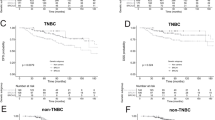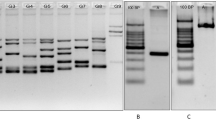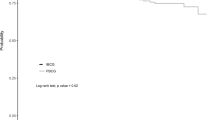Abstract
Genetic testing for BRCA1 and BRCA2 mutations is gaining acceptance in clinical oncology worldwide and may help target unaffected high-risk women for prevention and for close surveillance. Annual screening with MRI seems to be an effective surveillance strategy, but the long term follow-up of women with small MRI-detected breast cancers is necessary to establish its ultimate value. Women with cancer and a BRCA mutation may benefit from tailored treatments, such as cisplatin or olaparib. The treatment goals for a woman with a BRCA-associated breast cancer should be to prevent recurrence of the initial cancer and to prevent second primary breast and ovarian cancers. Mutations in BRCA1 and BRCA2 are presented throughout the world and it is important that the benefits of genetic testing and of targeted therapies be extended to women who live outside of North America and Western Europe.
Key Points
-
Genetic testing for BRCA1 and BRCA2 is facilitated by the presence of one or more founder mutations in a population
-
Ideally, prevention of hereditary breast cancer should encompass the entire period of risk
-
Preventive oophorectomy reduces the risks of both breast and ovarian cancer
-
Tamoxifen is currently the only drug approved for breast cancer prevention in premenopausal women
-
The treatment of patients with breast cancer who have a BRCA1 or BRCA2 mutation should target the recurrence of the initial cancer and prevention of second primary cancers
-
Rapid genetic testing at the point of breast cancer diagnosis may influence treatment plan, in particular with regard to the use of novel agents, such as cisplatin and olaparib
This is a preview of subscription content, access via your institution
Access options
Subscribe to this journal
Receive 12 print issues and online access
$209.00 per year
only $17.42 per issue
Buy this article
- Purchase on Springer Link
- Instant access to full article PDF
Prices may be subject to local taxes which are calculated during checkout
Similar content being viewed by others
References
Miki, Y. et al. A strong candidate for the breast and ovarian cancer susceptibility gene BRCA1. Science 266, 66–71 (1994).
Wooster, R. et al. Identification of the breast cancer susceptibility gene BRCA2. Nature 378, 789–792 (1995).
Phelan, C. M. et al. A low frequency of non-founder BRCA1 mutations in Ashkenazi Jewish breast-ovarian cancer families. Hum. Mutat. 20, 352–357 (2002).
Warner, E. et al. Prevalence and penetrance of BRCA1 and BRCA2 gene mutations in unselected Ashkenazi Jewish women with breast cancer. J. Natl Cancer Inst. 91, 1241–1247 (1999).
Moslehi, R. et al. BRCA1 and BRCA2 mutation analysis of 208 Ashkenazi Jewish women with ovarian cancer. Am. J. Hum. Genet. 66, 1259–1272 (2000).
Metcalfe, K. A. et al. Screening for founder mutations in BRCA1 and BRCA2 in unselected Jewish women. J. Clin. Oncol. 28, 387–391 (2010).
Verhoog, L. C. et al. Large regional differences in the frequency of distinct BRCA1/BRCA2 mutations in 517 Dutch breast and/or ovarian cancer families. Eur. J. Cancer 37, 2082–2090 (2001).
Ghadirian, P. et al. The contribution of founder mutations to early-onset breast cancer in French-Canadian women. Clin. Genet. 76, 421–426 (2009).
Górski, B. et al. Founder mutations in the BRCA1 gene in Polish families with breast-ovarian cancer. Am. J. Hum. Genet. 66, 1963–1968 (2000).
Sokolenko, A. P. et al. Founder mutations in early-onset, familial and bilateral breast cancer patients from Russia. Fam. Cancer 6, 281–286 (2007).
Uglanitsa, N. et al. The contribution of founder mutations in BRCA1 to breast cancer in Belarus. Clin. Genet. 78, 377–380 (2010).
Elsakov, P. et al. The contribution of founder mutations in BRCA1 to breast and ovarian cancer in Lithuania. Clin. Genet. 78, 373–376 (2010).
Tikhomirova, L. et al. High prevalence of two BRCA1 mutations, 4154delA and 5382insC, in Latvia. Fam. Cancer 4, 77–84 (2005).
Tulinius, H. et al. The effect of a single BRCA2 mutation on cancer in Iceland. J. Med. Genet. 39, 457–462 (2002).
Harboe, T. L. et al. A high frequent BRCA1 founder mutation identified in the Greenlandic population. Fam. Cancer 8, 413–419 (2009).
Loizidou, M. et al. Contribution of BRCA1 and BRCA2 germline mutations to the incidence of early-onset breast cancer in Cyprus. Clin. Genet. 71, 165–170 (2007).
Donenberg, T. et al. Identification of a recurring BRCA1 mutation in Bahamian women with breast cancer [abstract 2040]. Breast Cancer Res. Treat. 106 (Suppl. 1), S98 (2007).
Torres, D. et al. High proportion of BRCA1/2 founder mutations in Hispanic breast/ovarian cancer families from Colombia. Breast Cancer Res. Treat. 103, 225–232 (2007).
Gomes, M. C. et al. Prevalence of BRCA1 and BRCA2 mutations in breast cancer patients from Brazil. Breast Cancer Res. Treat. 103, 349–353 (2007).
Donenberg, T. et al. A high prevalence of BRCA1 mutations among breast cancer patients from the Bahamas. Breast Cancer Res. Treat. doi:10.1007/s10549-010-1156-9
Górski, B. et al. A high proportion of founder BRCA1 mutations in Polish breast cancer families. Int. J. Cancer 110, 683–686 (2004).
Risch, H. A. et al. Population BRCA1 and BRCA2 mutation frequencies and cancer penetrances: a kin-cohort study in Ontario, Canada. J. Natl Cancer Inst. 98, 1694–1706 (2006).
Foulkes, W. D. et al. Germline BRCA1 mutations and a basal epithelial phenotype in breast cancer. J. Natl Cancer Inst. 95, 1482–1485 (2003).
Young, S. R. et al. The prevalence of BRCA1 mutations among young women with triple-negative breast cancer. BMC Cancer 9, 86 (2009).
Fostira, F. et al. Prevalence of BRCA1 mutations among 284 women with triple-negative breast cancer [abstract]. J. Clin. Oncol. ASCO Annual Meeting Proceedings 28 (May 20 Suppl.), 1511 (2010).
Lakhani, S. R. et al. Prediction of BRCA1 status in patients with breast cancer using estrogen receptor and basal phenotype. Clin. Cancer Res. 11, 5175–5180 (2005).
Evans, D. G. et al. Addition of pathology and biomarker information significantly improves the performance of the Manchester scoring system for BRCA1 and BRCA2 testing. J. Med. Genet. 46, 811–817 (2009).
Metcalfe, K. A. et al. International variation in rates of uptake of preventive options in BRCA1 and BRCA2 mutation carriers. Int. J. Cancer 122, 2017–2022 (2008).
Heemskerk-Gerritsen, B. A. et al. Prophylactic mastectomy in BRCA1/2 mutation carriers and women at risk of hereditary breast cancer: long-term experiences at the Rotterdam Family Cancer Clinic. Ann. Surg. Oncol. 14, 3335–3344 (2007).
Warner, E. et al. Surveillance of BRCA1 and BRCA2 mutation carriers with magnetic resonance imaging, ultrasound, mammography, and clinical breast examination. JAMA 292, 1317–1325 (2004).
Kriege, M. et al. Efficacy of MRI and mammography for breast-cancer screening in women with a familial or genetic predisposition. N. Engl. J. Med. 351, 427–437 (2004).
Leach, M. O. et al. Screening with magnetic resonance imaging and mammography of a UK population at high familial risk of breast cancer: a prospective multicentre cohort study (MARIBS). Lancet 365, 1769–1778 (2005).
Warner, E. et al. A prospective study of breast cancer incidence and stage distribution in women with a BRCA1 or BRCA2 mutation under surveillance with and without magnetic resonance imaging. J. Clin. Oncol. (in press).
Brekelmans, C. T. et al. Effectiveness of breast cancer surveillance in BRCA1/2 gene mutation carriers and women with high familial risk. J. Clin. Oncol. 19, 924–930 (2001).
Scheuer, L. et al. Outcome of preventive surgery and screening for breast and ovarian cancer in BRCA mutation carriers. J. Clin. Oncol. 20, 1260–1268 (2002).
Komenaka, I. K. et al. The development of interval breast malignancies in patients with BRCA mutations. Cancer 100, 2079–2083 (2004).
Vasen, H. F. et al. Early detection of breast and ovarian cancer in families with BRCA mutations. Eur. J. Cancer 41, 549–554 (2005).
Verhoog, L. C., Brekelmans, C. T., Seynaeve, C., Meijers-Heijboer, E. J. & Klijn, J. G. Contralateral breast cancer risk is influenced by the age at onset in BRCA1-associated breast cancer. Br. J. Cancer 83, 384–386 (2000).
Metcalfe, K. et al. Contralateral breast cancer in BRCA1 and BRCA2 mutation carriers. J. Clin. Oncol. 22, 2328–2335 (2004).
Graeser, M. K. et al. Contralateral breast cancer risk in BRCA1 and BRCA2 mutation carriers. J. Clin. Oncol. 27, 5887–5892 (2009).
Pierce, L. J. et al. Ten-year multi-institutional results of breast-conserving surgery and radiotherapy in BRCA1/2-associated stage I/II breast cancer. J. Clin. Oncol. 24, 2437–2443 (2006).
Dent, R. et al. Triple-negative breast cancer: clinical features and patterns of recurrence. Clin. Cancer Res. 13, 4429–4434 (2007).
Rennert, G. et al. Clinical outcomes of breast cancer in carriers of BRCA1 and BRCA2 mutations. N. Engl. J. Med. 357, 115–123 (2007).
Antoniou, A. et al. Average risks of breast and ovarian cancer associated with BRCA1 or BRCA2 mutations detected in case series unselected for family history: a combined analysis of 22 studies. Am. J. Hum. Genet. 72, 1117–1130 (2003).
Gronwald, J. et al. Tamoxifen and contralateral breast cancer in BRCA1 and BRCA2 carriers: an update. Int. J. Cancer 118, 2281–2284 (2006).
King, M. C. et al. Tamoxifen and breast cancer incidence among women with inherited mutations in BRCA1 and BRCA2: National Surgical Adjuvant Breast and Bowel Project (NSABP-P1) Breast Cancer Prevention Trial. JAMA 286, 2251–2256 (2001).
Vogel, V. G. et al. Update of the National Surgical Adjuvant Breast and Bowel Project Study of Tamoxifen and Raloxifene (STAR) P-2 Trial: Preventing breast cancer. Cancer Prev. Res. (Phila) 3, 696–706 (2010).
Metcalfe, K. A. et al. Predictors of contralateral prophylactic mastectomy in women with a BRCA1 or BRCA2 mutation: the Hereditary Breast Cancer Clinical Study Group. J. Clin. Oncol. 26, 1093–1097 (2008).
Beiner, M. E. et al. The risk of endometrial cancer in women with BRCA1 and BRCA2 mutations. A prospective study. Gynecol. Oncol. 104, 7–10 (2007).
Eisen, A. et al. Breast cancer risk following bilateral oophorectomy in BRCA1 and BRCA2 mutation carriers: an international case-control study. J. Clin. Oncol. 23, 7491–7496 (2005).
Rebbeck, T. R., Kauff, N. D. & Domchek, S. M. Meta-analysis of risk reduction estimates associated with risk-reducing salpingo-oophorectomy in BRCA1 or BRCA2 mutation. J. Natl Cancer Inst. 101, 80–87 (2009).
Finch, A. et al. Salpingo-oophorectomy and the risk of ovarian, fallopian tube, and peritoneal cancers in women with a BRCA1 or BRCA2 mutation. JAMA 296, 185–192 (2006).
Madalinska, J. B. et al. The impact of hormone replacement therapy on menopausal symptoms in younger high-risk women after prophylactic salpingo-oophorectomy. J. Clin. Oncol. 24, 3576–3582 (2006).
Rebbeck, T. R. et al. Effect of short-term hormone replacement therapy on breast cancer risk reduction after bilateral prophylactic oophorectomy in BRCA1 and BRCA2 mutation carriers: the PROSE Study Group. J. Clin. Oncol. 23, 7804–7810 (2005).
Eisen, A. et al. Hormone therapy and the risk of breast cancer in BRCA1 mutation carriers. J. Natl Cancer Inst. 100, 1361–1367 (2008).
Beral, V., Bull, D., Green, J. & Reeves, G. Ovarian cancer and hormone replacement therapy in the Million Women Study. Lancet 369, 1703–1710 (2007).
Evans, D. G. et al. Risk reducing mastectomy: outcomes in 10 European centres. J. Med. Genet. 46, 254–258 (2009).
Rebbeck, T. R. et al. Bilateral prophylactic mastectomy reduces breast cancer risk in BRCA1 and BRCA2 mutation carriers: the PROSE Study Group. J. Clin. Oncol. 22, 1055–1062 (2004).
Gaffney, D. K. et al. Response to radiation therapy and prognosis in breast cancer patients with BRCA1 and BRCA2 mutations. Radiother. Oncol. 47, 129–136 (1998).
Pierce, L. J. et al. Effect of radiotherapy after breast-conserving treatment in women with breast cancer and germline BRCA1/2 mutations. J. Clin. Oncol. 18, 3360–3369 (2000).
Shanley, S. et al. Late toxicity is not increased in BRCA1/BRCA2 mutation carriers undergoing breast radiotherapy in the United Kingdom. Clin. Cancer Res. 12, 7025–7032 (2006).
Shanley, S. et al. Acute chemotherapy-related toxicity is not increased in BRCA1 and BRCA2 mutation carriers treated for breast cancer in the United Kingdom. Clin. Cancer Res. 12, 7033–7038 (2006).
Price, M. & Monteiro, A. N. Fine tuning chemotherapy to match BRCA1 status. Biochem. Pharmacol. 80, 647–653 (2010).
Bhattacharyya, A., Ear, U. S., Koller, B. H., Weichselbaum, R. R. & Bishop, D. K. The breast cancer susceptibility gene BRCA1 is required for subnuclear assembly of Rad51 and survival following treatment with the DNA cross-linking agent cisplatin. J. Biol. Chem. 4, 23899–23903 (2000).
Kurebayashi, J. et al. Loss of BRCA1 expression may predict shorter time-to-progression in metastatic breast cancer patients treated with taxanes. Anticancer Res. 26, 695–701 (2006).
Chabalier, C. et al. BRCA1 downregulation leads to premature inactivation of spindle checkpoint and confers paclitaxel resistance. Cell Cycle 5, 1001–1007 (2006).
Evers, B. et al. Selective inhibition of BRCA2-deficient mammary tumor cell growth by AZD2281 and cisplatin. Clin. Cancer Res. 14, 3916–3925 (2008).
Tassone, P. et al. Loss of BRCA1 function increases the antitumor activity of cisplatin against human breast cancer xenografts in vivo. Cancer Biol. Ther. 8, 648–653 (2009).
Rottenberg, S. et al. High sensitivity of BRCA1-deficient mammary tumors to the PARP inhibitor AZD2281 alone and in combination with platinum drugs. Proc. Natl Acad. Sci. USA 105, 17079–17084 (2008).
Robson, M. E. et al. A combined analysis of outcome following breast cancer: differences in survival based on BRCA1/BRCA2 mutation status and administration of adjuvant treatment. Breast Cancer Res. 6, R8–R17 (2004).
Byrski, T. et al. Response to neo-adjuvant chemotherapy in women with BRCA1-positive breast cancers. Breast Cancer Res. Treat. 108, 289–296 (2008).
Byrski, T. et al. Pathologic complete response rates in young women with BRCA1-positive breast cancers after neoadjuvant chemotherapy. J. Clin. Oncol. 28, 375–379 (2010).
Silver, D. P. et al. Efficacy of neoadjuvant cisplatin in triple-negative breast cancer. J. Clin. Oncol. 28, 1145–1153 (2010).
McCabe, N. et al. Deficiency in the repair of DNA damage by homologous recombination and sensitivity to poly(ADP-ribose) polymerase inhibition. Cancer Res. 66, 8109–8115 (2006).
Farmer, H. et al. Targeting the DNA repair defect in BRCA mutant cells as a therapeutic strategy. Nature 434, 917–921 (2005).
Fong, P. C. et al. Inhibition of poly(ADP-ribose) polymerase in tumors from BRCA mutation carriers. N. Engl. J. Med. 361, 123–134 (2009).
Tutt, A. et al. Oral poly(ADP-ribose) polymerase inhibitor olaparib in patients with BRCA1 or BRCA2 mutations and advanced breast cancer: a proof-of-concept trial. Lancet 376, 235–244 (2010).
Author information
Authors and Affiliations
Ethics declarations
Competing interests
The author declares no competing financial interests.
Rights and permissions
About this article
Cite this article
Narod, S. BRCA mutations in the management of breast cancer: the state of the art. Nat Rev Clin Oncol 7, 702–707 (2010). https://doi.org/10.1038/nrclinonc.2010.166
Published:
Issue Date:
DOI: https://doi.org/10.1038/nrclinonc.2010.166
This article is cited by
-
Epigenome editing and epigenetic gene regulation in disease phenotypes
Korean Journal of Chemical Engineering (2022)
-
PARP inhibitor Olaparib Enhances the Apoptotic Potentiality of Curcumin by Increasing the DNA Damage in Oral Cancer Cells through Inhibition of BER Cascade
Pathology & Oncology Research (2020)
-
Risk-reducing mastectomy: a case series of 124 procedures in Brazilian patients
Breast Cancer Research and Treatment (2020)
-
miRNA expression profiling of hereditary breast tumors from BRCA1- and BRCA2-germline mutation carriers in Brazil
BMC Cancer (2020)
-
Folic acid supplement use and breast cancer risk in BRCA1 and BRCA2 mutation carriers: a case–control study
Breast Cancer Research and Treatment (2019)



